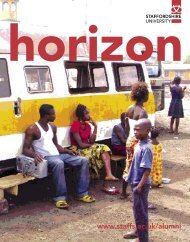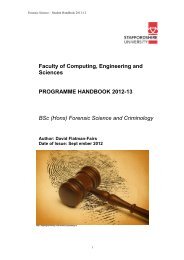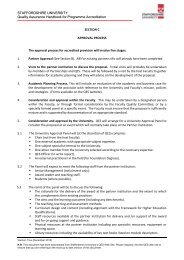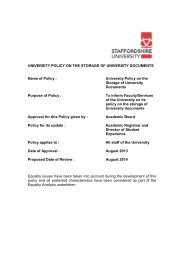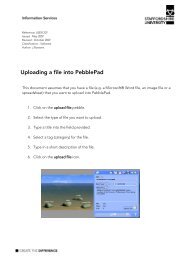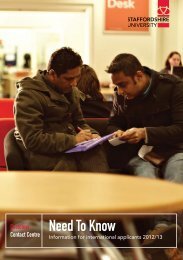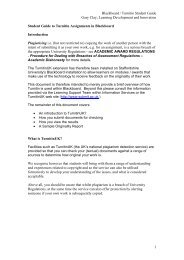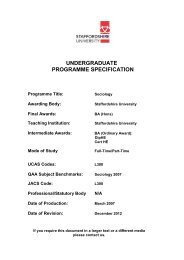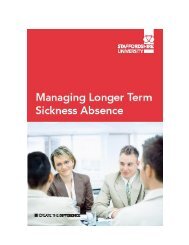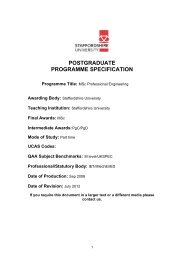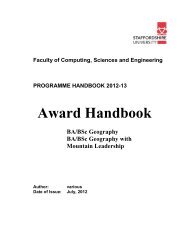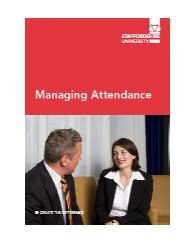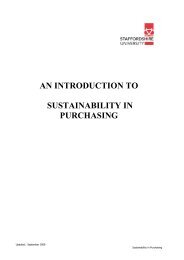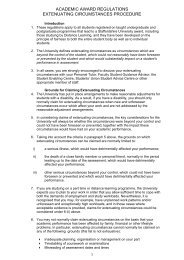Paramedic Practice - Staffordshire University
Paramedic Practice - Staffordshire University
Paramedic Practice - Staffordshire University
You also want an ePaper? Increase the reach of your titles
YUMPU automatically turns print PDFs into web optimized ePapers that Google loves.
in your development retrospectively! However, we understand that the concept<br />
and skills of portfolio development can be difficult to understand initially and urge<br />
you to contact your personal or module tutor immediately if you are struggling with<br />
any aspect. Your personal tutor will discuss and encourage your progress in<br />
developing your portfolio at periodic personal progress tutorials.<br />
You will use the portfolio to support the assessment of your competence and<br />
professional development, collecting within it the supporting evidence of learning,<br />
reflection and achievement required by mentors when completing their summative<br />
(final) assessment of practice at the end of each year.<br />
4.7.5 Learning Clinical Skills – skills laboratories<br />
Care delivery is a practice based discipline and the acquisition of clinical skills is<br />
essential for your development as a paramedic (HPC 2007). You will have<br />
dedicated skills teaching sessions in small groups within dedicated skills<br />
laboratories in each year of your programme of study as an integrated part of your<br />
care delivery modules. Learning skills in the skills laboratories provide you with the<br />
opportunity to observe and practice skills within a safe environment and help to<br />
facilitate your integration of theory with practice for from the onset of the Award.<br />
This is important to help build your confidence by practicing skills under close<br />
tutorial supervision prior to using them in the clinical environment. Skills‟ teaching<br />
is carried by paramedic/nursing lecturers together with dedicated skills facilitators.<br />
You will access the <strong>University</strong> campus at Stafford for delivery of the taught<br />
component, while practice of clinical skills will be through access to emergency and<br />
out of hospital placements in the <strong>Staffordshire</strong> locality. Simulated practice of clinical<br />
skills will take place in the Faculty‟s well equipped clinical skills laboratories. Skills<br />
laboratories at the Stafford campus offer clinical as well as a simulated home<br />
environment, while students will also have access to a community house at our<br />
Stoke campus, at which simulated scenarios can be enacted and viewed via CCTV<br />
in the resource area (quality lab)<br />
Experiential learning is an important facet used in healthcare education so<br />
experiences in the Skills Laboratory and the community house are used to<br />
simulate “real” experiences to which you may be exposed in practical placements.<br />
Tutors will act as facilitators in enabling you to reflect on your clinical experiences<br />
in order to consolidate learning. The practice and development of clinical learning<br />
in placements, clinical skills laboratory and a simulated home environment are<br />
essential to the integration of theory and practice for this paramedic practitioner<br />
role.<br />
As part of your clinical skills teaching you will undertake an Objective Structured<br />
Clinical Examination (OSCE) – a simulated assessment that will demonstrate safe<br />
practice. This will take place in year 1 (see assessment schedule for dates)<br />
Due to the nature of your learning in the skills laboratory/community home and<br />
the simulated experience we aim to create there are specific guidelines<br />
designed to maintain this environment and protect your personal safety.<br />
Please ensure you have read the STUDENT CONDUCT REGULATIONS<br />
before your first session in the skills laboratory.<br />
20



